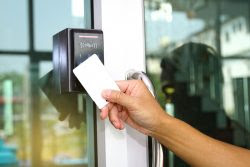Different Types of Fire Alarm Systems
There are numerous different fire alarm systems to choose from when it comes to guarding your business and precious means in the event of a fire. Not all are created equal and depending on the nature of your business there are numerous considerations when choosing a system that's right for you.
For utmost office structures, the standard fire alarm system is acceptable protection in the event of a fire and generally involves a centrally located panel that controls the system. Exercising sprinklers to put out the fire, the sprinklers are actuated when a fire is detected through the use of a bank or heat sensor. Since utmost lower office structures do not use chemicals to suffocate or smother the fire, this is generally the least precious and cost-effective result.
For larger companies with varied work surroundings, the fire alarm system must be more sophisticated and designed with diversity in mind to cover not only the structure itself but also the outfit and data it contains. In the case of a data center, standard sprinklers would beget significant damage to computer systems so numerous companies use a fire repression system that removes oxygen from the room, effectively starving the fire. This system leaves both the outfit and data in tactfulness and in utmost cases only leaves a fine greasepaint to clean up after deployment. Since this particular system deprives the area of oxygen, there would need to be some kind of warning medium in place so that workers would have time to void the area before deployment.
For businesses dealing with dangerous chemicals similar to in the case of manufacturing, there are fire alarm systems that are specialized to effectively suppress a fire that involves poisonous chemicals. Understandably, there are tighter laws governing the use of these chemicals, and the fire repression technology demanded to ensure that any fire in this terrain poses a minimum threat to workers and the public in general. Numerous of these chemicals can be explosive in nature when on fire and it's essential that all safety preventives possible be employed when furnishing protection for the business.
Obviously, the larger the business, the more complex the fire alarm system would be. Frequently, the system is set up to cover and emplace only for specific zones. This way, if there were a fire on one side of the structure, the sprinklers or fire repression chemicals would only be stationed to that portion of the structure. This minimizes damage to precious outfits and cabinetwork by fire retardant or water in locales that are untouched by the fire.
An important aspect of any fire alarm system is the mortal element involved. Yes, you want to make sure that means are defended as much as possible, but you also need to consider the impact of any fire repression deployment on anyone who might be in the position at the time of deployment. Obviously, water is the safest for mortal exposure in the event of a fire, but safety becomes indeed more consummate when using chemicals. Also, there should be visual pointers of fire in addition to audible admonitions. This way, those who are hearing or vision bloodied will be notified of the fire and know that they need to void the structure. Utmost fire admonitions involve the use of audible enchantresses or bells, but having visual pointers similar to flashing lights assists those who may be hearing disabled.
Completing a careful analysis of what has advanced precedence in terms of demanding protection in the event of a fire will help you determine which of the fire alarm systems will give you the protection you need while keeping your costs at a minimum. Keeping the company's essential data defended should be high precedence as outfit and cabinetwork can be replaced but client lists, counting data, or force figures can be insolvable to replace. Fire alarm systems are an essential and frequently fairly needed way to cover both your business and the people who work there in the event of a fire.


Comments
Post a Comment